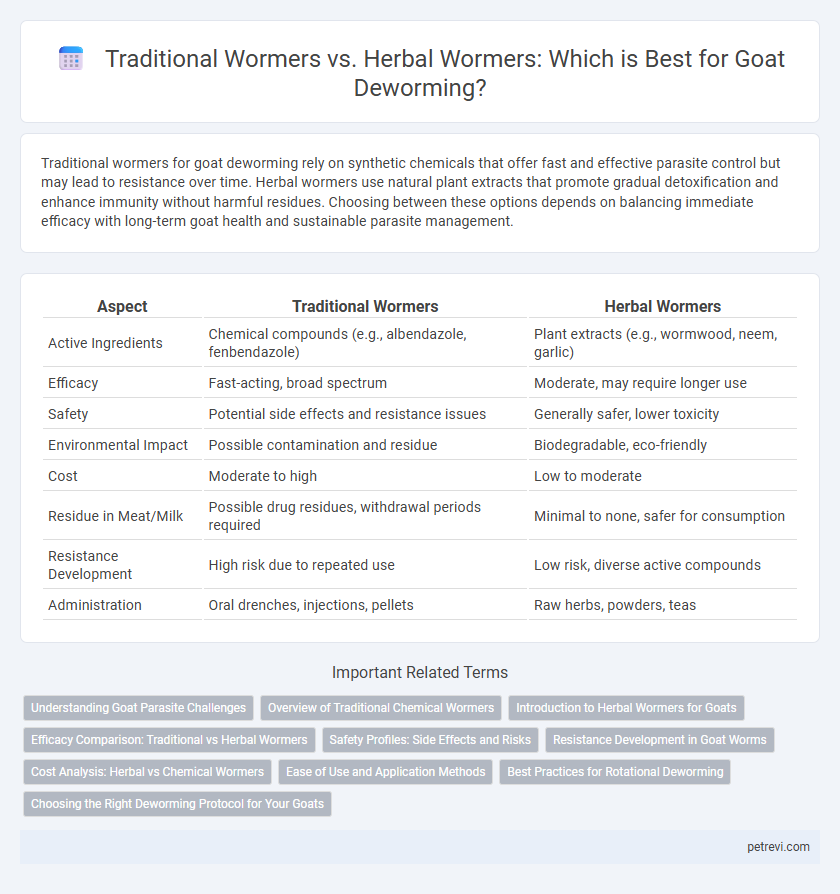Traditional wormers for goat deworming rely on synthetic chemicals that offer fast and effective parasite control but may lead to resistance over time. Herbal wormers use natural plant extracts that promote gradual detoxification and enhance immunity without harmful residues. Choosing between these options depends on balancing immediate efficacy with long-term goat health and sustainable parasite management.
Table of Comparison
| Aspect | Traditional Wormers | Herbal Wormers |
|---|---|---|
| Active Ingredients | Chemical compounds (e.g., albendazole, fenbendazole) | Plant extracts (e.g., wormwood, neem, garlic) |
| Efficacy | Fast-acting, broad spectrum | Moderate, may require longer use |
| Safety | Potential side effects and resistance issues | Generally safer, lower toxicity |
| Environmental Impact | Possible contamination and residue | Biodegradable, eco-friendly |
| Cost | Moderate to high | Low to moderate |
| Residue in Meat/Milk | Possible drug residues, withdrawal periods required | Minimal to none, safer for consumption |
| Resistance Development | High risk due to repeated use | Low risk, diverse active compounds |
| Administration | Oral drenches, injections, pellets | Raw herbs, powders, teas |
Understanding Goat Parasite Challenges
Goat parasite challenges include resistant worm populations and environmental factors that reduce the effectiveness of traditional wormers, often based on synthetic anthelmintics like benzimidazoles. Herbal wormers utilize plant-based compounds such as tannins and essential oils, offering alternative mechanisms that can reduce parasite load while minimizing drug resistance. Integrating both traditional and herbal approaches optimizes parasite management by addressing resistance issues and promoting sustainable goat health.
Overview of Traditional Chemical Wormers
Traditional chemical wormers for goat deworming commonly include benzimidazoles, macrocyclic lactones, and imidazothiazoles, which are effective against a broad spectrum of gastrointestinal parasites. These synthetic anthelmintics work by targeting the nervous system or metabolism of worms, resulting in their paralysis and expulsion from the host. Resistance to traditional chemical wormers is increasingly reported, urging periodic rotation and strategic deworming protocols to maintain efficacy and reduce parasite load in goat herds.
Introduction to Herbal Wormers for Goats
Herbal wormers for goats offer a natural alternative to traditional chemical dewormers by utilizing plant-based ingredients like wormwood, garlic, and peppermint, which possess anthelmintic properties. These herbal treatments promote gut health and boost the immune system, reducing parasite loads without the risks of drug resistance or harmful residues in milk and meat. Farmers increasingly prefer herbal wormers for sustainable parasite control, aligning with organic farming practices and animal welfare standards.
Efficacy Comparison: Traditional vs Herbal Wormers
Traditional wormers for goats typically contain synthetic active ingredients such as ivermectin or fenbendazole, which have well-documented efficacy against a broad spectrum of parasitic worms. Herbal wormers, often derived from plants like garlic, neem, or wormwood, offer a natural alternative but generally show variable efficacy depending on the formulation and parasite species involved. Research indicates that while herbal remedies may support gut health and reduce worm loads, traditional anthelmintics remain more consistently effective in achieving complete deworming in goats.
Safety Profiles: Side Effects and Risks
Traditional wormers for goat deworming often contain synthetic chemicals that can lead to side effects such as gastrointestinal irritation, liver toxicity, and potential drug resistance with improper use. Herbal wormers, derived from plants like wormwood and neem, generally have a safer profile with fewer documented adverse effects but may vary in efficacy and dosage standardization. Evaluating safety profiles requires considering the risk of toxicity, residue potential in milk and meat, and the long-term impact on the goat's immune system.
Resistance Development in Goat Worms
Traditional wormers for goat deworming often lead to resistance development in goat worms due to frequent and improper use of chemical anthelmintics like benzimidazoles and macrocyclic lactones. Herbal wormers, sourced from plants such as neem, garlic, and wormwood, offer a natural alternative with lower risk of resistance but require more research to confirm consistent efficacy. Integrating herbal treatments with strategic pasture management can help reduce drug resistance and improve long-term parasite control in goats.
Cost Analysis: Herbal vs Chemical Wormers
Traditional chemical wormers for goat deworming often have a higher upfront cost but provide fast-acting, broad-spectrum parasite control, making them widely used in commercial farming. Herbal wormers, derived from natural plant extracts such as neem and wormwood, tend to be more affordable and sustainable long-term options, reducing the risk of chemical resistance and environmental impact. Evaluating cost-effectiveness involves considering not only the purchase price but also factors such as parasite resistance development, withdrawal periods, and overall animal health benefits.
Ease of Use and Application Methods
Traditional wormers for goats typically offer precise dosing through oral drenches or injectable forms, ensuring quick and effective parasite control but often require careful measurement and handling. Herbal wormers, while generally easier to administer via feed additives or pastes, may have variable dosing and slower efficacy due to natural ingredient potency. Both methods demand consistent application schedules, but herbal options are favored for their minimal chemical exposure and user-friendly integration into daily feeding routines.
Best Practices for Rotational Deworming
Rotational deworming for goats involves alternating between traditional anthelmintic wormers and herbal remedies to reduce parasite resistance and improve efficacy. Best practices include scheduling treatments based on fecal egg counts, using herbal wormers like wormwood or neem during off-cycles to maintain gut health, and integrating pasture management strategies to limit reinfection. This approach optimizes parasite control while supporting the goat's overall immune system and minimizing chemical drug residues.
Choosing the Right Deworming Protocol for Your Goats
Traditional wormers for goats, such as benzimidazoles and avermectins, offer fast and reliable parasite control with proven efficacy against a broad spectrum of gastrointestinal nematodes. Herbal wormers utilize plant-based ingredients like garlic, wormwood, and neem, promoting natural parasite resistance and reducing chemical residue in meat and milk. Selecting the appropriate deworming protocol depends on factors like parasite load, resistance patterns, withdrawal periods, and integrating targeted selective treatment to optimize goat health and minimize anthelmintic resistance.
Traditional wormers vs Herbal wormers for Goat deworming Infographic

 petrevi.com
petrevi.com